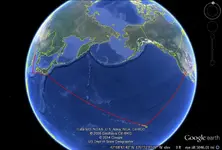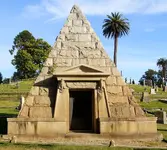There were several reasons why the United States became interested in revitalizing contact between Japan and the West in the mid-19th century.
First, the combination of the opening of Chinese ports to regular trade and the annexation of California, creating an American port on the Pacific, ensured that
there would be a steady stream of maritime traffic between North America and Asia. Then, as
American traders in the Pacific replaced sailing ships with steam ships, they needed to secure coaling stations, where they could stop to take on provisions and fuel while making the long trip from the United States to China. The combination of its
advantageous geographic position and rumors that
Japan held vast deposits of coal increased the appeal of
establishing commercial and diplomatic contacts with the Japanese. Additionally, the
American whaling industry had pushed into the North Pacific by the mid-18th century, and sought safe harbors, assistance in case of shipwrecks, and reliable supply stations.
Commodore Matthew Perry arrived in Japanese waters with a
small squadron of U.S. Navy ships, because he and others believed
the only way to convince the Japanese to accept western trade was to display a willingness to use its advanced firepower. (I thought this was suposed to be diplomatic

)At the same time, Perry brought along a variety of gifts for the Japanese Emperor, including
a working model of a steam locomotive,
a telescope,
a telegraph, and a variety of wines and liquors from the West, all intended to impress upon the Japanese the superiority of Western culture.
The following spring, Perry
returned with an even larger squadron to receive Japan’s answer. The Japanese
grudgingly agreed to Perry’s demands, and the two sides
signed the Treaty (
AT GUN POINT)of Kanagawa on March 31, 1854. According to the terms of the treaty, Japan would protect stranded seamen and open two ports for refueling and provisioning American ships: Shimoda and Hakodate. Japan also gave the United States the right to appoint consuls to live in these port cities, a privilege not previously granted to foreign nations.
The first U.S. consul assigned to a Japanese port was Townsend Harris. Like many of the early consuls in Asia, Harris was a
New York merchant dealing with Chinese imports.(this would turn out good!!!!!!!) He arrived in Shimoda in 1856, but, lacking the navy squadron that strengthened Perry’s bargaining position, it took Harris far longer to convince the Japanese to sign a more extended treaty. Ultimately, Japanese officials learned of how the British used military action to compel the opening to China, and decided that it was better to open its doors willingly than to be forced to do so. The United States and Japan signed their first true commercial treaty, sometimes called the Harris Treaty, in 1858.
Now I ask you.....Is that not
strongarming? Who was in control of theses moves on Japan? They were not the decisions of Perry or Harris on their own. Don't you find it a bit ironic that Perry's first gifts to the Emperor of Japan were: Telescope (to see the stars and planets) , replica of steam engine (representing the railroads) and a telegraph. both of these things were being controlled by the K.G.C. at that time, until the transcontinental route was chosen and another struggle began. The significance of the telescope?,Let's just say "The heavens have always held a special place in the organizations heart......

"
L.C.





 )At the same time, Perry brought along a variety of gifts for the Japanese Emperor, including a working model of a steam locomotive, a telescope, a telegraph, and a variety of wines and liquors from the West, all intended to impress upon the Japanese the superiority of Western culture.
)At the same time, Perry brought along a variety of gifts for the Japanese Emperor, including a working model of a steam locomotive, a telescope, a telegraph, and a variety of wines and liquors from the West, all intended to impress upon the Japanese the superiority of Western culture.  "
"


